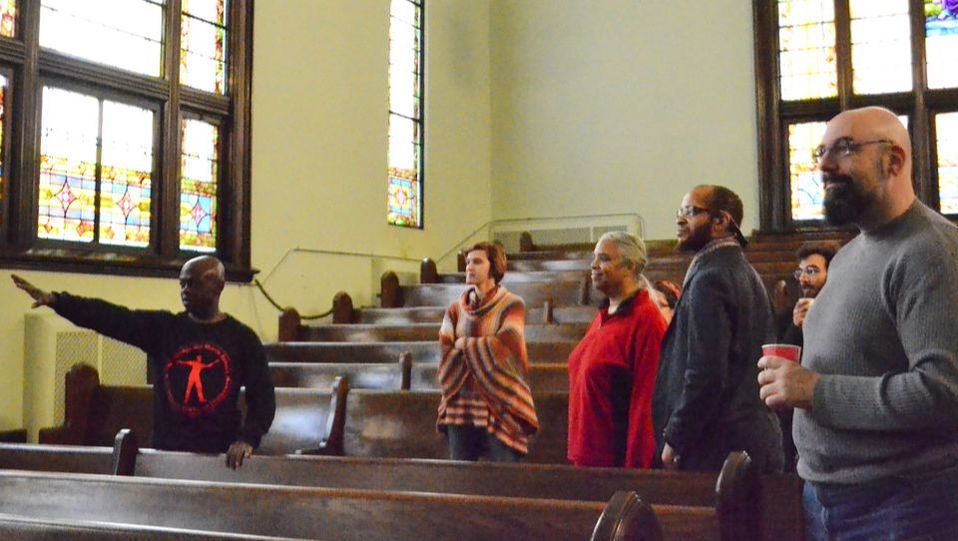However, CSLN members and community residents were interested in exploring different approaches to technology, what Mike Strode of the Kola Nut Collaborative calls “social technology”. Similar to ICA’s Technology of Participation, this concept reclaims the underlying assumption of technology that is more about systematically applying knowledge than merely creating highly-specialized devices such as smartphones. The smartphone may be a recent development, but process-based thinking is ancient and deeply rooted in community.
Windsor Park Lutheran Church, in the South Shore community area of Chicago, is an unassuming hub of technology. A few years ago, an innovative digital inclusion partnership between the church, Leave No Veteran Behind, and Cambium Networks caught the attention of Smart Chicago Collaborative, who called the project “one to watch and potentially replicate in neighborhoods with similar challenges and community assets.” CSLN member Alvyn Walker, who works with both Windsor Park Church and Leave No Veteran Behind, explained that Cambium Networks helped install an antenna on the steeple of the church that helps beam free wi-fi to anyone in the vicinity with a device that can access it. This supports youth programming, such as Tech Girlz workshops, and veterans services provided by Leave No Veteran Behind. If internet access is the first barrier to digital inclusion, then tech literacy is the second. Say you have a problem in your community that you’d like to help solve. You also have a smartphone or computer and access to internet at home, at your church, or at a local cafe. Now what? One place you might start is the City of Chicago Data Portal, where you can search for information about the 2019 budget, flu shot locations, traffic crashes, 311 calls, building permits, lobbying statistics, and more. For more than six years, the City of Chicago and Cook County have been releasing vast quantities of information to the public. So much, in fact, as to be totally overwhelming to a casual user. This is where Chi Hack Night comes in. As member Josh Kalov explained, this group of “designers, academic researchers, data journalists, activists, policy wonks, web developers and curious citizens” hosts a weekly hack night in which techies and non-techies alike come together to connect data to community challenges. That problem you had earlier? Pitch it at Chi Hack Night and someone might approach you with an idea of how to leverage data and tech to solve it. Michael Chladek shared the example of Quantify Justice News. Seeking to examine coverage of domestic abuse in the Chicago Tribune and Sun Times, the project collected far more data than its volunteers could actually read. It came to Chi Hack Night looking for a solution and was introduced to machine learning, wherein a computer learns to categorize data by recognizing patterns. That data has now been mapped, revealing disproportionate reporting about violence committed by people of color, among other trends. Mike Strode, a CSLN member and Exchange Coordinator of Kola Nut Collaborative, has also hosted a working group at Chi Hack Night. Strode explained that Kola Nut is a timebank, “a member operated reciprocal exchange service in which members offer their time, skills and service to other members in return for time dollars.” In other words, Kola Nut seeks to systematically apply individually-held knowledge to community-wide concerns—a social technology that encourages connections and collaboration. Jonathan Rogoff offered five steps for framing technical conversations with non-techies: define the problem, identify the stakeholders, keep your eyes on the data, consider the resources and obstacles, and measure outcomes. These principles, he suggests, facilitate effective collaboration between community practitioners and computer programmers. That framework was quickly put into practice, as participants split into four breakout groups focused on youth programming, asset mapping, allocating food surpluses, and changing perceptions of Chicago’s South Side through positive storytelling. Each group identified how assets in the relevant community might intersect with data to accelerate change. Breakout group reports shared many common themes of visualizing and connecting existing assets. In a final reflection, ICA staff member Samantha Sainsbury asked, simply, “what happened here today?” Participants’ responses tell the story: they “connected,” “collaborated, “activated social technology,” “had imagination expanded,” and, perhaps most importantly, “saw the beginning of something,” and “gained focus on how to proceed. Comments are closed.
|
|
4750 N Sheridan Rd, Chicago, IL 60640
773 769 6363 x 335 |
Copyright 2022. The Institute of Cultural Affairs. All rights reserved.

